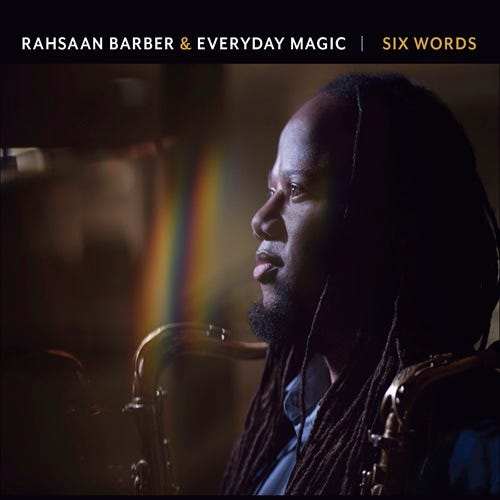Rahsaan Barber & Everyday Magic - Six Words
Jazz Music City, 2024)
Nashville is not called “Music City” for nothing. Memphis is the same. Besides being hubs for country and soul music, respectively, they began as home for many jazz musicians, including Sophia Goodman (Receptive (Joyous Records, 2024)), John Alvey (Loft Glow (Jazz Music City Records, 2024), and the Jazz Ensemble of Memphis (Playing In The Yard (Memphis International Records, 2024)). Saxophonist Rahsaan Barber started off in Nashville, accepting an assistant professorship at the University of North Carolina at Chapel Hill. What doing this has done for the saxophonist is provide him with a financial stability that does not solely support himself on the road. With greater time to devote to composing and recording, Barber reconstitutes his band Everyday Magic, a quintet that mirrors the Curtis Fuller era of the Jazz Messengers, which includes trumpeter Pharez Whitted, Barber’s twin brother, trombonist Roland, pianist Matt Endahl, bassist Kevin Beardsley, and drummer Joshua Hunt.
Six Words is a provocative title for the eight original compositions, referring to a quote by Wynton Marsalis: “There is power in this music.” Barber proves the point by taking his new group to Nashville to record. Not only had this band not performed together, Barber cheekily withheld the charts until right before the sessions, as Miles Davis did when recording Kind Of Blue (Columbia, 1959). What the listener hears is sight-reading at tempo - a star in the crown of all jazz musicians. These are impressive results. “Unity, Parts I and II” ties this project together with layered themes and musical stream-of-conscience playing. “Part I” starts an urgent call, allowing “Part II” to conclude the thought, as if beginning in the middle of the piece and finding its way back to the beginning. After a lengthy and introspective introduction, “The Long Wait For Justice” settles into a polyrhythmic groove propelled by Hunt and pianist Endahl. Barber’s homage to the late Roy Hargrove, “Remembering Roy,” is an intensely emotive ballad featuring the leader on alto saxophone. Barber realizes the piece as a lengthy introduction, never becoming a full-blown song. It is like a memory where the subject fades, leaving only the music.


